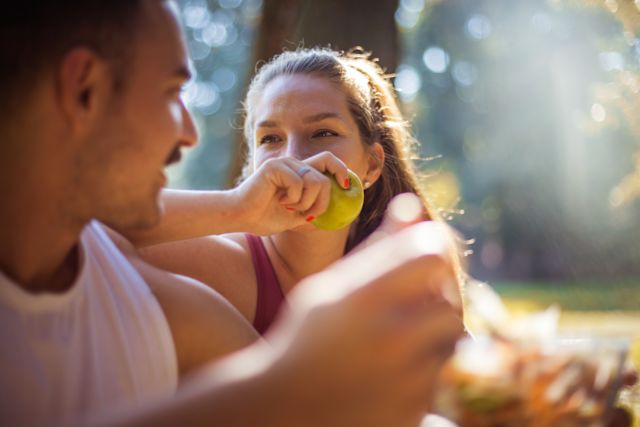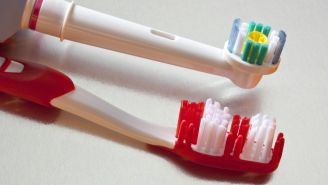Updated on August 3, 2022.
Last night, the tacos smothered in onions were great. But this morning, your breath could fell a sumo wrestler. What to do?
Your first step is figuring out the cause of your bad breath. Halitosis, the medical term for bad breath, could be related to an underlying medical disorder, such as gingivitis or a respiratory infection. And tobacco users tend to have ‘smoker’s breath,’ caused by lingering cigarette smoke in the throat and lungs; they’re also at higher risk for gum disease. These bad-breath culprits may require visiting a healthcare provider for treatment.
Much more commonly, however, bad breath stems from eating certain foods. For example, some members of the allium family, such as onions and garlic, contain chemicals with sulfur. When you chew them, they release odorous gases. And since the food is absorbed into the bloodstream, your bad breath may remain until the food is cleared from the body.
Leftover food in your mouth also helps to feed bacteria behind your tongue. When this bacteria comes across amino acids in the foods, an aromatic waste product is left as a parting gift.
Good choices for bad breath
If food is causing your problem, the easiest remedy is to brush your teeth. But there are times when you suddenly notice bad breath—maybe in the middle of a busy workday or a date—where it’s not so easy to sneak off to the bathroom. Instead, try countering breath-busting foods with what's likely to be handiest: other foods.
Lemons
Lemons are chock-full of vitamin C, which helps keep your mouth clean. To freshen your breath, chew on a lemon wedge, or pour yourself a glass of lemon juice to get the citrus fruit’s full effect. Another option is ordering sparkling water with lemon or keeping lemon-flavored hard candies in your bag in case of emergencies. Just beware of overdoing it since too much lemon may damage tooth enamel. Avoid eating citrus garnishes at restaurants, as well—they may be covered in germs.
Green or black tea
Both drinks contain polyphenols that slow the growth of odor-producing bacteria. One March 2021 study published in the journal Healthcare found that people who rinsed with black tea for 30 seconds continued to show a reduction in odor-causing bacteria after two hours.
Apples
One potential cause of bad breath is a dry mouth. If you skipped out on water all day or are prone to breathing through your mouth, your body may have a tough time producing saliva. Without saliva, your mouth isn’t cleaned as regularly, and bacteria that usually washes away can fester. The American Dental Association recommends eating apples because they require a lot of chewing, which generates saliva.
Crunchy spices
Pick up some anise, cardamom, coriander, and fennel seeds, available in the spice aisle of most grocery stores. Mix equal parts in a small, covered bowl, and keep it on your desk or the dining room table next to the salt and pepper. One 2015 study in the International Journal of Pharmaceutical Sciences and Research found that chewing on fennel or cardamon seeds increased saliva, potentially creating an antibacterial effect.
Mint sprigs or cinnamon sticks
Either of these potent flavors can lessen the sulfurous scent of onion and garlic. Plus, an essential oil in cinnamon kills a nasty type of oral bacteria, discouraging it from setting up house in your mouth. Cinnamon or mint gum is just as effective because chewing it can stimulate saliva. Just make sure the gum is sugar-free, as odor-causing bacteria feed off sugar, leaving acid behind to rot your teeth. Sugar-free gum and mints with xylitol may improve your oral health by getting rid of bacteria and reducing cavities.
Berries and citrus fruits
If you can't get through most days without indulging in foods that are less than breath-friendly, eat for prevention, which is even better than a cure. Berries, melons, oranges, and other fruits high in vitamin C can help deter mouth bacteria.
Don't forget to drink water, either, which can help to clear bad breath by washing away little bits of food. And of course, the best way to keep bad breath from occurring is by flossing daily and brushing your teeth—and tongue—twice a day for two minutes with fluoride toothpaste. This not only removes food particles from your mouth, it helps prevent oral diseases that contribute to bad breath.







